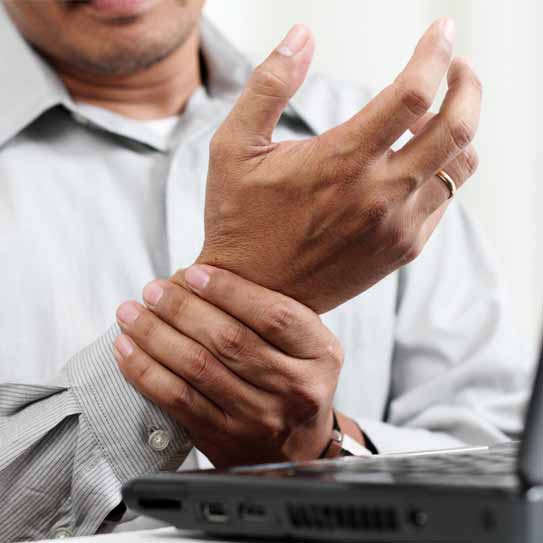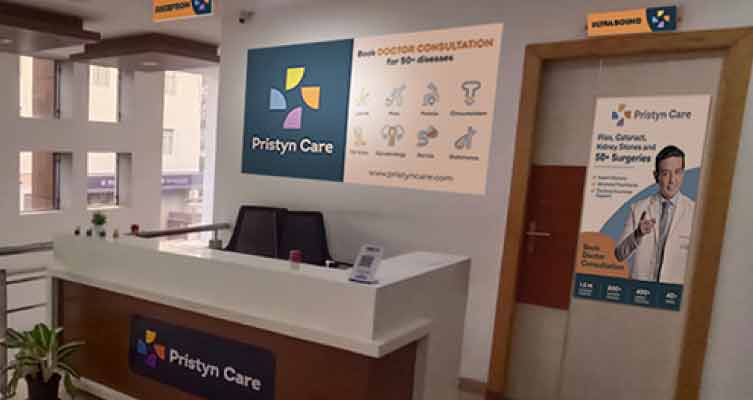What are the major risk factors associated with carpal tunnel syndrome?
Risk factors associated with carpal tunnel syndrome are:-
- People with small carpal tunnels hereditarily are more likely to get carpal tunnel syndrome.
- Women are three times more likely to get carpal tunnel syndrome, especially during pregnancy due to constant hormonal fluctuations.
- Patients between the ages of 40 and 70.
- Wrist injury including sprained and fractured wrists.
- Frequent exposure of hands to extreme temperatures.
- Medical conditions such as overactive pituitary gland, hypothyroidism, rheumatoid arthritis, diabetes, etc.
- Delayed complication of improperly managed Colles’ fracture.
- Repetitive movements of hands or wrists.
What are the stages of carpal tunnel syndrome (CTS)?
There are three stages in carpal tunnel syndrome:
Stage 1- Mild symptoms
In the initial stage, most patients only feel numbness and tingling sensation. The condition is usually reversible in this stage. Symptoms most observed during this stage of the disease are:
- Numbness or tingling of the palm and thumb, and fingers
- Clumsiness- dropping things
- Pain extending up to the elbow
- Loss of finger coordination of the fingers in one or both hands
- Weak grip
Stage 2- Moderate symptoms
Most people start noticing the symptoms of carpal tunnel in this stage, and hence it is the stage in which most people are diagnosed. The patients begin experiencing symptoms during the day as well as night and start having difficulty with everyday tasks such as getting dressed, holding small objects, driving, etc.
Stage 3- Severe symptoms
In the severe stage, the patients lose muscle function due to muscle atrophy. Symptoms during this stage include constant numbness and pain. In rare cases, the patient may not have complete muscle function even after surgery.
Complications of carpal tunnel release surgery
Endoscopic carpal tunnel release surgery is extremely safe, but in rare cases, it can be associated with certain complications such as:
- Excessive bleeding
- Infection
- Injury to the median nerve to the surrounding blood vessels
- Sensitivity to postoperative scar
The complications are much more prevalent in open surgeries or if the condition has gone untreated for a longer period of time. Recovery may take from a few weeks to a few months, and the patient needs to be very careful about the surgical site in this period.
Physiotherapy for carpal tunnel surgery
After carpal tunnel release surgery, if the patient does not follow proper rehabilitation and physiotherapy, then the recovery will take much longer. Physiotherapy helps avoid the build-up of scar tissue in the operated region and opens up the tunnel in the wrist to allow proper wrist function. It also helps regain a complete range of motion for the wrist. In addition to physiotherapy, patients should also wear assistive devices such as thumb splints to encourage recovery.
Common carpal tunnel syndrome exercises to follow after carpal tunnel surgery are:
- Fingertip touching: Hold up your hand, with palm side up and touch your thumb with each fingertip in both directions to complete a full cycle. Perform this exercise 3 to 5 times.
- Wrist flexion and stretch: Extend your arm with the wrist flexed at a 900 angle. Pull the wrist back by the other hand. Hold this position for 10-30 seconds 5-6 times for each hand.
- Tendon gliding: Hold your hand straight up and bend your fingers at a 900 angle towards the first knuckle while keeping the fingers together. Then, bend them towards the second knuckle, then form a fist. Then open the hand and repeat the action 5-10 times.
Why undergo carpal tunnel syndrome treatment at Pristyn Care?
Pristyn Care is among the best surgery providers in Visakhapatnam in association with the best orthopedic hospitals in Visakhapatnam. Our patients are very important to us, and to ensure their maximum care and comfort, we provide several facilities, including:
- Pristyn Care has the best orthopedic surgeons in Visakhapatnam on its panel who are experts in providing successful carpal tunnel treatment to patients without any complications.
- We provide affordable endoscopic carpal tunnel release surgery at the best orthopedic clinics in Visakhapatnam without compromising the quality of the treatment.
- We follow rigid COVID safety standards at all our treatment centers to ensure that our patients and their attendants are safe from coronavirus.
- We provide complete insurance support and help the patients with filing insurance claims.
- We provide cab and meal facilities to all patients on the day of the surgery.
How to book an appointment for carpal tunnel release surgery in Visakhapatnam through Pristyn Care?
You can book an appointment with the best orthopedic surgeons near you at Pristyn Care by:
- Download our patient care app and look through our doctor database, and book your appointment based on your symptoms.
- Call the number on the top of our page and talk to our care coordinator to book an appointment at your convenience.
- Fill in the ‘Book an Appointment’ form and our care coordinators will promptly reach out to you to book your appointment.









Pristyncare%20Clinic.webp)

.svg)









